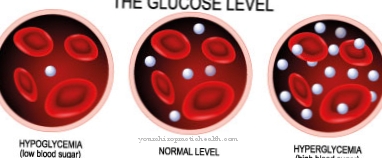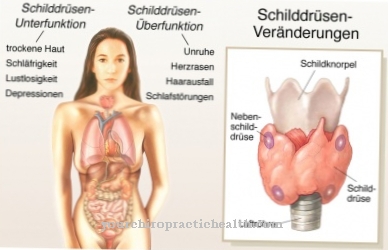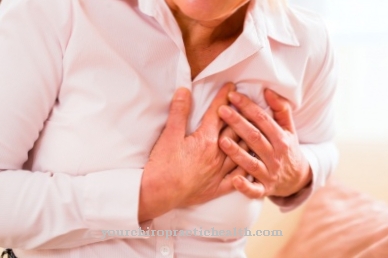The malaria is one of the most important and dangerous tropical infectious diseases. Due to this disease, travelers to tropical countries are particularly at risk. Malaria should be considered with any fever during or up to a year after a trip to the tropics. Before you start your journey, seek detailed advice from a doctor or your city's tropical institute about the risk of malaria.
What is malaria

© logo3in1 - stock.adobe.com
malaria is one of the most important tropical diseases worldwide and must be reported. It occurs mainly in the tropics and subtropics. Today it is assumed that almost half of the world's population lives in malaria areas. Malaria is transmitted through the bite of the female anopheles mosquito, which is infected with a malaria pathogen. An infection from person to person is almost impossible.
Malaria can be caused by four different types of pathogen. Of the currently three existing forms of malaria, tropica malaria is the most dangerous. While tertiana malaria and quartana malaria are mostly benign, tropica malaria often leads to life-threatening complications.
Despite large-scale control programs, the spread of malaria has increased in recent years. In addition, in large parts of South, South-East and East Asia, in Africa south of the Sahara and in tropical South America, the pathogens causing tropic malaria are less sensitive to the usual drugs; The preventive measures must therefore be tailored to the regional risks. They can vary with the seasons, are also different from country to country and depend on the type of travel (hotel vacation in large cities vs. safari expedition inland).
causes
malaria is caused by unicellular blood parasites called plasmodia, which attack the red blood cells. These malaria pathogens are transmitted locally by certain mosquitoes (anopheles mosquito).
There they multiply and cause the blood cells to burst after their development is complete. The released pathogens look for new blood cells and the cycle begins again.
Strong fever attacks are typical for all forms of malaria. They occur about every three days in tertian malaria and every four days in quartana malaria.
The fever attacks in the case of malaria tropica repeat at irregular intervals.
Symptoms, ailments & signs
The first symptoms of a malaria infection show up after a few days, weeks or months. It depends on the type of malaria. Malaria tropica has the shortest incubation period here with six days to three weeks. Malaria tertiana or malaria quartana have incubation times of a few days and sometimes months or years.
The first symptoms correspond to those of a severe flu infection. This leads to a high fever of over 38.5 degrees Celsius. In addition, there is a general feeling of illness with headaches, exhaustion and weakness. Those affected often suffer from chills and profuse sweating. There is nausea, muscle pain and circulatory problems. Occasionally, diarrhea and general intestinal problems occur.
The symptoms seldom appear together and vary in severity. The fever occurs periodically in the latter types of malaria. With malaria tropica, however, there are irregular attacks of fever. Tropica malaria rarely causes other symptoms without fever or malaise. Instead, there are circulatory problems (especially microcirculatory disorders), confusion and fainting attacks due to circulatory problems.
Overall, however, fever and a general feeling of illness are the main symptoms of malaria and should make you think about them immediately if there is a possible risk for this disease. It is true that the symptoms are considered to be evidence of a malaria infection even up to two years after the stay in a tropical region.
Course of disease
The incubation period of malaria is from about seven to 40 days, depending on the type of pathogen. The attacks of fever occur quickly in quartana malaria and suddenly in the other two forms of malaria. Malaria tertiana and malaria quartana healed after 12 to 20 fever attacks. If left untreated, tropical malaria is often fatal. This form of the disease can lead to pulmonary edema, kidney failure or circulatory collapse.
The symptoms of an outbreak of malaria are often confused with those of a cold or gastrointestinal complaints. People do not always associate fever, headache, nausea, or vomiting with their trip to malaria areas. Especially not if it has been some time between the trip and the onset of symptoms. It is therefore important to know that it can take up to a year from the onset of the disease to the onset of symptoms.
Complications
Because of a malaria infection, there is a risk of various complications. These can sometimes have serious consequences. The risk of complications is highest in malaria tropica. Almost all deaths are caused by them.
A typical consequence of malaria tropica is impaired consciousness, which can even lead to the death of the sick person. It is not uncommon for an abrupt change in the state of consciousness without any omens. With cerebral malaria there is also a risk of neurological complications such as seizures and paralysis. Pregnant women and children are often at risk of low blood sugar (hypoglycaemia). This sometimes leads to a coma.
Because the spleen enlarges in the course of malaria, a rupture of the organ is possible. Severe infections also show anemia (anemia). Babies and toddlers are particularly affected. In most cases, there is haemolytic anemia, in which the red blood cells are destroyed.
Another conceivable complication is hemoglobinuria. The hemoglobin level in the blood rises and the iron-containing protein complex hemoglobin is excreted via the kidneys, which is noticeable by a dark urine color. Furthermore, acute failure of the kidneys is possible due to circulatory disorders. Complications of the lungs occur in around ten percent of all malaria patients. These range from mild complaints to pulmonary edema (water lung).
When should you go to the doctor?
If you experience flu-like symptoms that increase in scope and intensity within a short period of time, you should see a doctor. If you have a fever, headache, aching limbs or a significant decrease in performance, a doctor should be consulted. If the symptoms occur during or after a stay in tropical or subtropical regions, a doctor must be consulted immediately. This is especially true if a mosquito bite is noticed on the body. Since malaria can be fatal in severe cases, medical care is required as soon as possible. If the fever continues to rise, chills, or consciousness disorders, a doctor should be consulted.
A special characteristic of malaria is a changing course of the temperature curve. It is therefore always necessary to check whether an ambulance service needs to be alerted in the event of an increasing deterioration in health. If there are seizures, digestive disorders, abnormalities when using the toilet or pain in the kidneys, a doctor should be consulted. The person concerned is at risk of organ failure if he does not undergo treatment. Diarrhea, circulatory disorders, dizziness and symptoms of paralysis are further warning signs of the organism. A doctor's visit is necessary so that the cause can be clarified. Cravings, internal weakness, an acute feeling of illness and irritability must be clarified by a doctor.
Treatment & Therapy
A blood test can malaria can be diagnosed very quickly and easily, as the pathogens can be easily seen under the microscope. The severity of the disease can be determined by the number of parasites and the number of leukocytes (number of inflammatory cells).
Malaria is treated by using active ingredients that kill the pathogen. One of the most famous anti-malarial drugs is quinine. In most cases, treatment is carried out on an outpatient basis. Only one malaria tropica should be inpatient because of the severity of the disease and the possible complications.
The chances of a cure for malaria tertiana and quartana are good and if tropica malaria is detected early, the mortality rate in Germany is currently less than one percent.
To prevent malaria, travelers should first find out whether their travel destination is in a malaria area. The most common malaria infections occur in Africa.

Most of the mosquitoes south of the Sahara to northern South Africa are infected with plasmodia. But there are also different risk areas in Indonesia, India and South America.
The mosquitoes are crepuscular and nocturnal and live near wetlands. By taking medication and avoiding mosquito bites, malaria can be effectively prevented. A vaccination against malaria is not yet possible. Protective measures include protection against mosquito bites and taking tablets for malaria prophylaxis.
The drugs for malaria prophylaxis largely protect against serious malaria disease. However, malaria cannot be ruled out one hundred percent even with prophylaxis.
Outlook & forecast
If left untreated, the tropical disease leads to the premature death of those affected. The complications of malaria without medical care are very pronounced. Organic disorders, loss of consciousness, seizures and paralysis occur. The person affected is no longer able to regulate their own way of life. Ultimately, death occurs from multiple organ failure.
Nevertheless, the disease is curable with today's medical possibilities in our regions. The earlier medical treatment is initiated, the better the future prospects. If the diagnosis is made quickly and therapy is started quickly, the prognosis for malaria is favorable. It is therefore important to pay attention to where the person concerned is currently. Medical care in an African area is less well structured than in Europe. For this reason, adequate precaution should be taken before starting a trip to a malaria area.
In addition, a doctor should be consulted on site at the first signs to make a prognosis. Immediate medical attention must be provided to prevent the pathogen from spreading. In a poor state of health, the transport of the person affected from Africa to the home area cannot always be guaranteed. These development opportunities must be planned and taken into account before starting a trip.
prevention
The practical prevention against malaria includes the above-mentioned malaria prophylaxis and active protection against mosquito bites. The fewer the stings, the lower the risk of infection. So what exactly can you do in your holiday destination ?:
- Sleep in rooms with air conditioning or secure windows and doors with mosquito nets.
- Spray the bedrooms with insect sprays before going to bed or use a socket vaporizer or incense coils. Be careful in bedrooms with small children.
- Sleep under mosquito nets at night (important for infants and young children). The mesh fabric must not have any holes, the free seams should be pulled under the mattress.
- Malaria mosquitoes mostly bite at dusk and at night. When outdoors, wear light-colored, loose-fitting clothing that covers the entire body (long trousers, long shirts, socks, shoes).
- Rub bare skin (e.g. hands, feet and face) with mosquito repellent lotions. Avoid large-scale use in children.
Aftercare
Infectious diseases such as malaria often need good follow-up care after they have healed. It is aimed at strengthening the immune system and the regeneration of those affected and, above all, the aim of avoiding further complications. This requires close checks by the attending physician.
In the area of internal infections, which mainly affect the gastrointestinal area or the respiratory tract, the immune system can be strengthened by a number of measures that are in the patient's hands. This includes a balanced diet, sufficient amounts of water to drink and enough sleep. It is also important not to start sporting activities too early if the person concerned is not yet able to perform well enough. This should be done in consultation with the doctor.
The function of the intestine is often impaired by medication given as part of the infection. This is especially true when antibiotics are given. A non-stressful diet helps with aftercare. Yoghurt products are often able to rebuild a disturbed intestinal flora. In general, with tropical diseases such as malaria, care should be taken to ensure that recovery is complete in order to prevent a relapse or further symptoms.
You can do that yourself
In the case of malaria, medical treatment is required in any case. Medical therapy can be supported by a number of self-help measures and home remedies.
First of all, it is advisable to take it easy on the body and drink a lot. During a malaria fever, the diet should consist of light meals such as chicken broth, rusks or soft-boiled rice. After the illness has been overcome, fruits and vegetables as well as mineral-rich foods are ideal. The Artemisia plant is a proven natural remedy. The herb can be taken either dried or in the form of tea, and it relieves the typical symptoms of malarial fever. The use of this agent should be discussed with a doctor beforehand.
If medical help cannot be found, self-treatment is also possible as a temporary solution. When traveling to malaria areas, an appropriate malaria emergency medication should be carried with you. However, in some cases it is essential to consult a doctor. In the case of complicated malaria, for example, a hospital stay is required in any case, as functional disorders of the lungs or heart can occur. In order to be able to return to everyday life at an early stage, bed rest and compliance with medical recommendations apply.






.jpg)

















.jpg)



